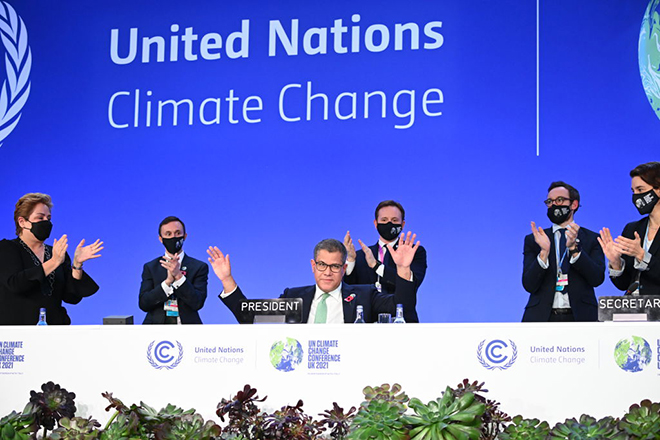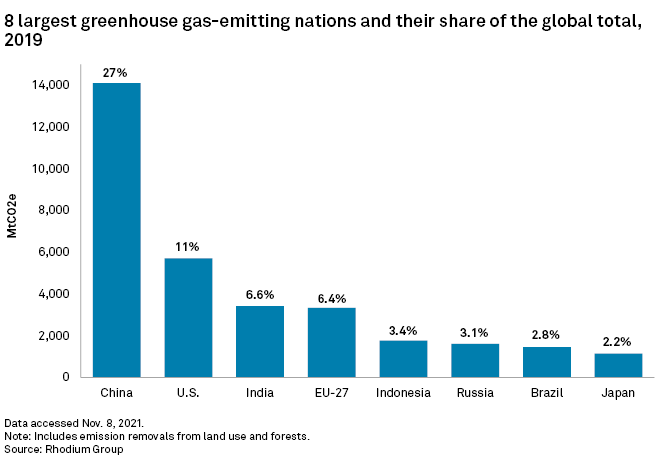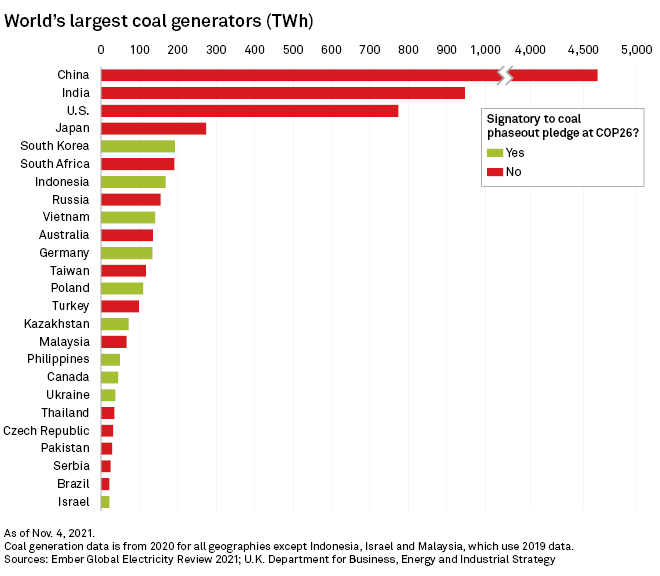S&P Global Offerings
Featured Topics
Featured Products
Events
S&P Global Offerings
Featured Topics
Featured Products
Events
S&P Global Offerings
Featured Topics
Featured Products
Events
Banking & Capital Markets
Economy & Finance
Energy Transition & Sustainability
Technology & Innovation
Podcasts & Newsletters
Banking & Capital Markets
Economy & Finance
Energy Transition & Sustainability
Technology & Innovation
Podcasts & Newsletters
S&P Global Offerings
Featured Topics
Featured Products
Events
15 Nov, 2021
By Karin Rives

|
COP26 President Alok Sharma receives applause after nations reached a climate deal Nov. 13. |
Under pressure to avoid catastrophic climate change, nearly 200 nations agreed for the first time to phase down unabated coal-fired power plants and most fossil fuel subsidies while pledging to submit more ambitious emission reduction targets just a year from now.
The 11-page Glasgow Climate Pact also adds pressure on nations to quickly ramp up efforts to reduce greenhouse gas emissions this decade in hopes of limiting the global temperature rise to 1.5 degrees C above preindustrial levels. By adopting the pact, they might be able to keep a narrow window open for meeting the most ambitious goal of the landmark 2015 Paris Agreement on climate change.
The unprecedented deal reached at the COP26 climate summit in Glasgow, Scotland, on Nov. 13 came after days of grueling and often tense negotiations over wording for the coal plant retirements, rules guiding a global carbon market, and how to compensate vulnerable nations for climate disasters happening today.
|
People bring water and food to neighbors in a Belgian town that suffered record-high rain tied to climate change in July 2021. |
"Together, over the past two weeks, parties have demonstrated what the world had come to doubt: That countries can rise above their differences to unite against a common challenge," an emotional COP26 President Alok Sharma told delegates after the Glasgow pact was adopted. "I think today we can say with credibility that we have kept 1.5 degrees within reach. But its pulse is weak, and it will only survive if we keep our promises and translate our commitments into rapid action."
Deep disagreements remained over the final Glasgow document, with the European Union and other nations telling the summit they were disappointed with the coal language becoming weaker at the last minute. Coal-dependent China and India nearly jeopardized the final deal by insisting that "phaseout" of coal plants be changed to "phase-down." Small island states and developing nations also demanded and failed to secure finance commitments for the loss and damage they already suffer from climate change.
In the end, government diplomats huddling in the cavernous conference center in Glasgow chose to set their differences aside to support the deal, which also finalized rules of the Paris accord.
Here is how nations delivered and fell short on three critical goals that the U.K. COP26 presidency set for the high-stakes summit.
1. Keeping 1.5 degrees C within reach
The Paris Agreement called on nations to keep the global temperature rise to "well below" 2 degrees and ideally to 1.5 degrees over preindustrial levels. If world leaders managed to keep hopes alive in Glasgow, they also kicked the can down the road by agreeing to revisit their emission pledges a year from now.

As part of their Paris commitments, countries were expected to deliver updated and more ambitious plans to the United Nations ahead of COP26, detailing how they planned to cut emissions by 2030. Unless the total output of climate-warming pollution is reduced by 45% below 2010 levels by 2030, a stabilized net-zero emissions world would become unattainable, scientists have warned.
In all, 13 countries and the 27-nation European Union submitted updated plans, known as Nationally Determined Contributions, but their effort fell short. Although the U.S. and many other countries set more ambitious carbon reduction goals in recent months, some nations simply resubmitted their 2015 emission reduction plans. Brazil and Mexico were among a few that even scaled back their ambitions.
Halfway through the conference, researchers sounded the alarm. Not a single country — including the world's top emitters — had policies in place that could zero out emissions by midcentury, Climate Action Tracker concluded. The world was on track to reach 2.4 degrees or higher, the organization projected.

The U.S. was among the nations in Glasgow that pushed for another round of Nationally Determined Contributions by late 2022 when leaders meet for the next climate summit in Egypt. It means nations get another chance to submit new and possibly significantly more ambitious plans next year.
2. Boosting climate finance
Developing nations wanted to see rich countries make good on a decade-old promise to award $100 billion annually to help them develop clean energy sources and adapt to rising sea levels, drought and other climate impacts. The vast majority of heat-trapping gases in the atmosphere were generated by the U.S. and other Western economies over the past 250 years.
The Glasgow Climate Pact promised to double funding for adaptation by 2025 and to report back on the progress they were making in meeting the $100 billion goal. It also, for the first time, called for a two-year dialogue on a finance mechanism to compensate nations for loss and damage. But the lack of concrete funding commitments and weak deliverables frustrated COP26 delegates and groups who for years had pushed for more support for vulnerable nations.
"It is inexcusable that developed countries failed to meet their commitment to deliver $100 billion annually starting in 2020, even as they provide hundreds of billions of dollars in subsidies for fossil fuels," Ani Dasgupta, president and CEO of the World Resources Institute, said in a statement.
Others warned that the failure to immediately address "loss and damage" could slow the overall global climate effort.
"Rich countries dragging their feet on the mechanism to compensate the poorest countries for climate damages that are already being suffered is shameful and has to be resolved," said Lauri Myllyvirta, a lead analyst at the Centre for Research on Energy and Clean Air. "Both because it's the right thing to do and because failure on this would greatly complicate things on emission reductions."
But COP26 attendees also pointed to major commitments the private financial sector made during the Glasgow summit, including a pledge by investors managing $130 trillion in assets to shift funds to help nations decarbonize their economies.
"Perhaps the big story of COP26 is how much of the action was not in the main conference hall where the government delegates were meeting, but rather what was going on in the side events where companies were announcing new sustainability initiatives and making net-zero greenhouse gas emissions pledges at an unprecedented rate," said Dan Esty, a Yale University environmental law professor and former U.S. Environmental Protection Agency top official under President George H.W. Bush.
Thirty countries along with numerous local governments, automakers and investors also signed a declaration to accelerate the shift to zero-emission vehicles during the two-week climate summit, and more than 130 leaders from government, corporations and financial firms promised to collaborate to halt deforestation by 2030.
3. Wrapping up carbon market rules
When Sharma hit his gavel Nov. 13 to declare "Article 6" of the Paris Agreement rulebook adopted, the COP26 meeting hall broke out in a cheer. An outstanding but critical part of the Paris rules, Article 6 spells out how nations can establish a global carbon market to help reduce their greenhouse gas emissions, which proved to be one of the thorniest issues to resolve from the 2015 pact.
"The agreed Article 6 rules give countries the tools they need for environmental integrity, to avoid double-counting [emission reductions] and ultimately to clear a path to get private capital flowing to developing countries," said Kelley Kizzier, the Environmental Defense Fund's vice president for global climate.
There has been concern over the Glasgow deal allowing countries to carry over old credits from the Kyoto Protocol that preceded the Paris Agreement to meet their new carbon reduction commitments. But Kizzier noted that the credit allowance was limited to 120 million metric tons of carbon and would not be allowed past the first round of national climate commitments.
4. COP26 signals an end to coal
While the national climate pledges disappointed, COP26 delivered in some other key areas that Sharma had deemed critical for meeting the 1.5-degree target: speeding up the retirement of coal plants and accelerating the adoption of electric vehicles.
Before agreeing to the new language on coal in the Glasgow Climate Pact, 46 nations had already pledged during the summit to phase out their coal fleets and to stop building new plants unless they are equipped with carbon capture technology. Three of the world's top 10 coal generators signed the deal but not the three largest ones — the U.S., China and India.

The focus on coal at COP26 was unprecedented and signals change, said Chris Littlecott, an associate director for the climate change think tank E3G.
"We have broken through the barrier of governments accepting that coal has to go," Littlecott said. "Even for those who are trying to slow it down and who try and do it on their own terms, that mental barrier has now gone."
